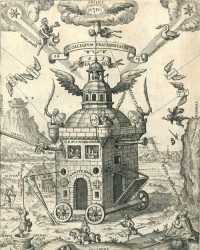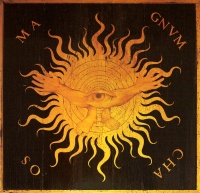Mysticism
From The Art and Popular Culture Encyclopedia

Illustration: The Ecstatic Virgin Anna Katharina Emmerich by (1885) by Gabriel Cornelius von Max See also Christian mysticism, Anne Catherine Emmerich, Teresa of Ávila, visionary
|
"Huysmans declares that the mystic is the most practical person alive — Yeats has dived deeply into the writings of the exalted, from Joachim of Flora to Jacob Boehme, from St. Teresa to William Blake. " --The Pathos of Distance (1913) by James Huneker "It has been said that "Mysticism finds in Plato all its texts," and certainly most of Christian Mysticism may be traced back to the Neo-Platonists. From their time to our own we find this tendency towards a theologia mystica appearing in one form or another, -whether it be in the secret traditions of the Jewish Cabala-in the preaching of Eckhart in the fourteenth century-in the revival of Neo-Platonism at Florence in the days of Cosmo de Medici-in the science of sympathies taught by Agrippa and Paracelsus - in Jacob Behmen's celestial visions-or in Saint Teresa's "four degrees" of prayer necessary to reach a perfect "quietism."--Plato (1874) by Clifton Wilbraham Collins |

Illustration: The Invisible College of the Rose Cross Fraternity

Magnum Chaos by Lorenzo Lotto and Giovan Francesco Capoferri
|
Related e |
|
Featured: |
Mysticism is popularly known as becoming one with God or the Absolute, but may refer to any kind of ecstasy or altered state of consciousness which is given a religious or spiritual meaning. It may also refer to the attainment of insight in ultimate or hidden truths, and to human transformation supported by various practices and experiences.
The term "mysticism" has Ancient Greek origins with various historically determined meanings. Derived from the Greek word μύω múō, meaning "to close" or "to conceal", mysticism referred to the biblical, liturgical, spiritual, and contemplative dimensions of early and medieval Christianity. During the early modern period, the definition of mysticism grew to include a broad range of beliefs and ideologies.
Since the 1960s scholars have debated the merits of perennial and constructionist approaches in the scientific research of "mystical experiences". The perennial position is now largely dismissed most scholars using a contextualist approach, which considers the cultural and historical context.
See also
- Henology
- Ludus amoris
- Mystery
- Mystification
- Numinous
- Philosophy of the Unconscious by Eduard von Hartmann
- Soul flight
- Spirit

